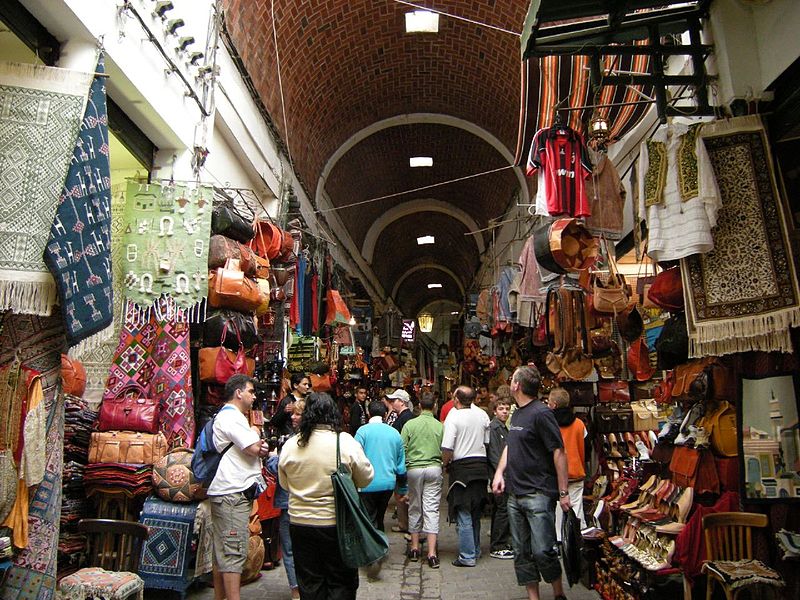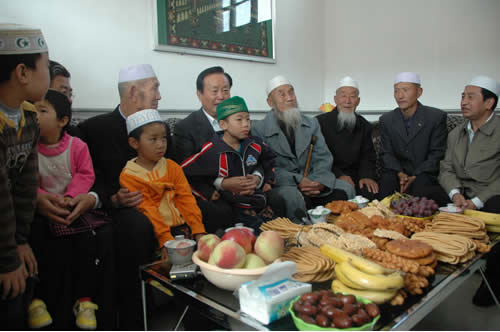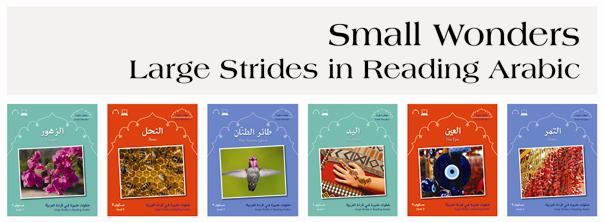As the month of Ramadan comes to an end, Muslims all over the world will begin preparations for the annual holiday Eid ul-Fitr which signals the end of Ramadan. Eid ul-Fitr is known by several names – the Sugar Feast, the Sweet Fest, or the Lesser Eid. The English translation of this holiday is “Feast of Breaking the Fast,” because it is celebrated on the first day after the end of Ramadan. Depending on where one lives and practices, this holiday could be celebrated for 1–3 days. On this occasion of the Lesser Eid, you will hear Muslims greet each other with the words ‘Eid Mubarak’ meaning ‘Blessed Holiday,’ or ‘Eid Sa’id’ meaning ‘Happy Holiday.’
 Souk in Tunis (image source: http://commons.wikimedia.org/wiki/File:Souk_of_Tunis.jpg)
Souk in Tunis (image source: http://commons.wikimedia.org/wiki/File:Souk_of_Tunis.jpg)
As for when that day comes, Muslims throughout the world await the announcement that the crescent moon has been sighted during the last days of Ramadan. This sighting would mark the end of one month, and the beginning of another. This is because the Muslim calendar, like many calendars throughout the world, is a lunar one. The decision of the beginning of a new month is usually announced by a body of religious scientists who study the cycles of the moon. Any announcement of the definitive start of a month is made the night before. So if anyone tells you that he or she knows Ramadan will end on a specific day, take their words with a grain of salt.
 Chinese An Hui family celebrates Eid (image source: http://en.m.wikipedia.org/wiki/File:Hui_family_eid.jpg)
Chinese An Hui family celebrates Eid (image source: http://en.m.wikipedia.org/wiki/File:Hui_family_eid.jpg)
Once the announcement is made, preparations for the holiday go into full swing. Shops will stay open longer, and most likely into the wee hours of the morning as shoppers head to the souks looking for the next day’s (or few days’) meats, sweets, and dress. Others will be preparing their zakat or charity for the needy. For those who don’t venture out shopping, they are mostly likely at home - decorating, and with ovens blazing, baking sweets –all in preparation for the countless visits of families and friends from near and far. This tradition of visiting friends and families is cemented by an old saying that encourages celebrators to “go out by one route and to come back by another.”
These days, however, the tradition of celebrating the Sugar Feast really begins on the first day of Ramadan. For most practicing Muslims, Ramadan is seen as a time to get things done. Besides fasting from sun up to sun down, some set goals. And most times the date of accomplishment is set as the first day of Eid ul-Fitr. For some people it could be as simple as saying one nice thing a day, or as difficult as quitting smoking. In this way, the celebration becomes a bit more personal when it signifies an individual accomplishment.
The ways in which people celebrate holidays around the world, from community activities to individual traditions, is always unique. Let us know how you celebrate your favorite holiday on Cheng & Tsui’s Facebook and Twitter.
And if you’d like to learn some basic Arabic words and facts related to bees and honey, sweet dates, or the cultural custom of designing on one’s hands (henna) for the holiday, you’ll enjoy Small Wonders: Large Strides in Reading Arabic.



Comments